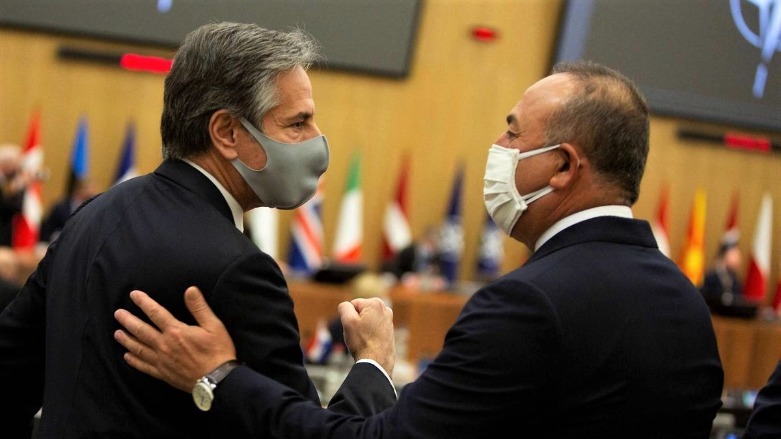Blinken-Cavusoglu meeting underscores chill in US-Turkish relations

WASHINGTON DC (Kurdistan 24) – US Secretary of State Antony Blinken and Turkish Foreign Minister Mevlut Cavusoglu met in Brussels on Wednesday on the sidelines of the NATO Foreign Ministers’ conference.
The event marked the first time that senior US and Turkish officials have met since Jan. 20, when President Joe Biden took office. It occurred against the backdrop of major problems within Turkey and in its relations with the US and reinforced the notion that ties between the two countries are not very good.
Flailing Turkish Economy
Turkey faces serious economic troubles, greatly exacerbated by Erdogan’s dismissal on Saturday of the head of Turkey’s central bank, who had sought to rein in the country’s inflation by hiking interest rates.
Raising interest rates decreases borrowing and with it, demand, cutting inflation. However, Erdogan believes the opposite: increasing interest rates does not cut inflation, in his view. Rather, he thinks that it increases prices – and with it inflation.
“Erdogan Tanks the Turkish Lira” is the title of a Wall Street Journal editorial, published on Wednesday, explaining that Erdogan’s penchant for low interest rates had prompted a 14% drop in the value of the Turkish lira.
“Erdogan is desperate to secure a phone call with Biden to give investors at home and abroad the impression that US-Turkish relations are back on track,” Aykan Erdemir, a former Turkish parliamentarian and now Senior Director of the Turkey program at the Foundation for the Defense of Democracies (FDD), told Kurdistan 24.
But “various statements from US officials this year and the readout of the Blinken-Cavusoglu meeting indicate that bilateral relations remain strained,” Erdemir added, and “Erdogan no longer enjoys the personal access he had to the White House under the Trump administration.”
Indeed, in late 2019, Biden, as a presidential candidate, told The New York Times that Erdogan was an “autocrat” and suggested the US should be “taking a very different approach to him now, making it clear that we support opposition leadership.”
Turkey’s Purchase of Russian Military Equipment
The sharpest point of contention between Washington and Ankara is Turkey’s acquisition of the Russian air defense system, the S-400, which Blinken “urged” Cavusoglu “not to retain.”
Cavusoglu rejected Blinken’s appeal, however, telling reporters after their meeting that Turkey’s acquisition of the S-400 was “a done deal.”
That deal, worth some $2.5 billion, was reached over three years ago: in December 2017, and it subject Turkey to economic sanctions under CAATSA: Countering America’s Adversaries Through Sanctions Act.
Passed by Congress in July 2017 and signed into law by Trump in August, CAATSA calls for sanctions on various parties, including those that purchase Russian military equipment.
Moreover, Washington (and NATO more broadly) have a particular problem with the S-400: its operation would allow Russia to learn how to better defeat America’s newest fighter jet—the F-35.
The US “pleaded with Ankara not to purchase the S-400, but Erdogan brushed aside Washington’s concerns and moved ahead anyway,” Brad Bowman, Senior Director of the FDD’s Center on Military and Political Power, told Kurdistan 24.
Trump did not want to sanction Turkey, but was obliged to do so by Congress, and in December 2020, he reluctantly imposed the economic penalties.
Blinken also cautioned Cavusoglu that Turkey would, most probably, face a second set of CAATSA sanctions, if it acquired additional Russian military equipment, including a second set of the S-400s or the Sukhoi Su-57 fighter jet and Su-35 air superiority plane, as Amberin Zaman reported in Al-Monitor, citing “diplomatic sources.”
A second round of CAATSA sanctions would likely be far more onerous than those imposed under Trump, given Biden’s negative view of Erdogan.
Bowman suggested that Russian President Vladimir Putin “seeks to use the S-400 as a tool to weaken America’s alliances and partnerships,” and “Erdogan has played the role of willing accomplice in that effort.”
Indeed, India now plans to purchase the S-400. Arguably, Trump’s reluctant response to the Turkish deal has encouraged other countries to believe they will face no serious penalty for doing so themselves.
On Saturday, Secretary of Defense Lloyd Austin visited New Delhi, and India’s planned purchase of the S-400 was among the matters he discussed there.
Human Rights: Kurds and Women
Blinken also “expressed concerns” to Cavusoglu over Turkey’s human rights record.
Last week, Ankara initiated legal proceedings that could well result in the banning of the pro-Kurdish Peoples’ Democratic Party (HDP), the second-largest party in the Turkish parliament.
The State Department warned then that doing so “would unduly subvert the will of Turkish voters, further undermine democracy in Turkey, and deny millions of Turkish citizens their chosen representation.”
Read More: US warns Turkey against suppressing pro-Kurdish HDP
Two days after initiating legal proceedings against the HDP, Erdogan issued a decree withdrawing Turkey from the Istanbul Convention, which proscribes violence against women. The move is generally understood as an attempt to bolster Erdogan’s support among religious conservatives.
Erdemir noted the “frequent” criticism from the Biden administration, in contrast to its predecessor, of Ankara’s “dismal human rights track record.”
“Given the meltdown in Turkish markets, Turkish officials will use every photo op available with American and European officials to portray the image of political stability,” Erdemir continued, but “Turkey’s financial woes are too great to cover up by such window-dressing.”
Editing by John J. Catherine
